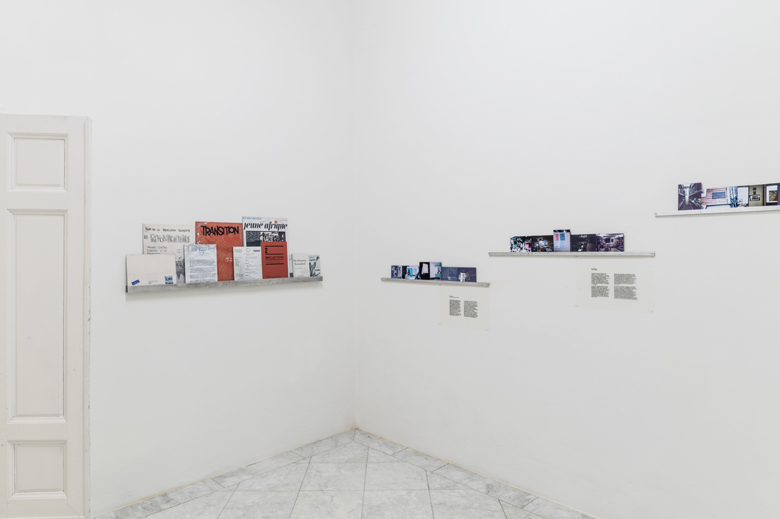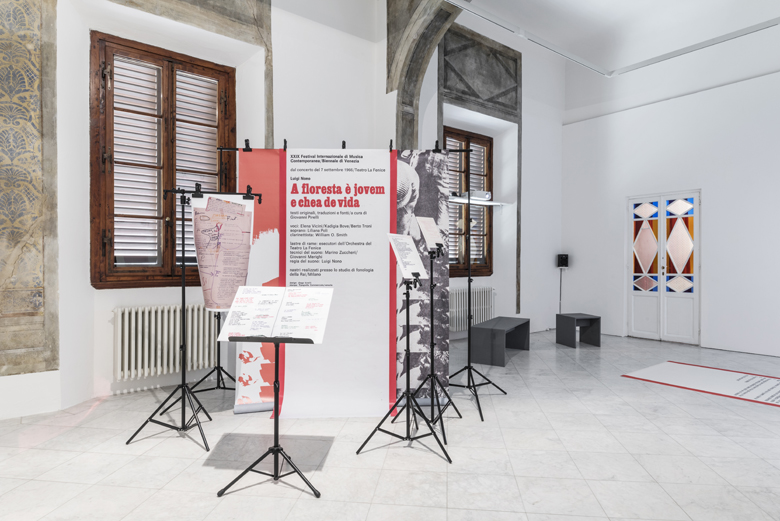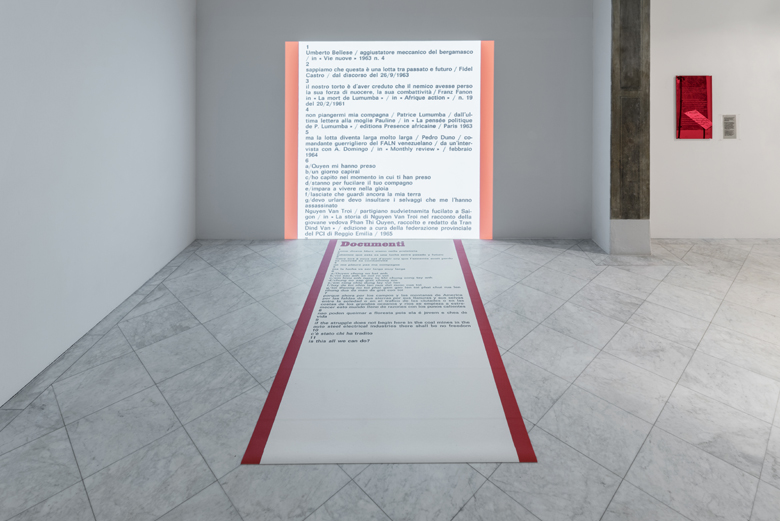Exhibitions
29 Mar 24 May 2019
A Bomb to be Reloaded
Alessandra Ferrini
We warmly invite you and your friends to the opening of the exhibition
on Friday, 29 March at 7.30 pm.
Opening hours: Tuesday to Friday 2 - 6 pm and by appointment

exhibition view, A Bomb to be Reloaded (Chapter 1)

exhibition view, A Bomb to be Reloaded (Chapter 1)

exhibition view, A Bomb to be Reloaded (Chapter 0)

exhibition view, A Bomb to be Reloaded (Chapter 2)

exhibition view, A Bomb to be Reloaded (Chapter 2)
photos OKNO studio
Exhibition program
Saturday, 5 April
5.30 pm
Istituto Ernesto de Martino, Sesto Fiorentino
Book Launch and Discussion
Vita di Giovanni Pirelli. Tra cultura e impegno militante by Mariamargherita Scotti (Donzelli, 2018)
The author will be in conversation with Kadigia Bove, actress, Alessandra Ferrini, artist, Simonetta Soldani, historian, and Pietro Clemente, anthropologist
Wednesday, 17 April
7.30 pm
Villa Romana
Book Launch
Italian Colonialism and Resistances to Empire, 1930-1970 by Neelam Srivastava (Palgrave, 2018)
The author will be in conversation with Angelica Pesarini (NYU Florence) and Alessandra Ferrini.
Friday, 24 May
Villa Romana
Finissage
A Bomb to be Reloaded is a long-term research project articulated through a series of collaborations and outputs. It aims to investigate the influence of Frantz Fanon's thought on a generation of militant intellectuals in Italy, and, in particular, on Giovanni Pirelli. Following his involvement in the resistance against fascism in the Second World War, he refused his predestined role at the head of the Pirelli dynasty to dedicate his life to cultural and political activism. His friendship with Fanon, whose work he had translated and published in Italy, led him to the founding of the Centro di Documentazione Frantz Fanon (CDFF), a research centre for the study and support of decolonial and anti-imperialist struggles that was active in Milan between 1963 and 1967. The centre hosted conferences, translated and published updates and analysis on the various revolutionary movements of the time, while also hosting an impressive library of books and periodicals on these causes.
Now dismembered, the collection is disseminated through different archives and resistant spaces in Milan: from archives of the Resistance movement against fascism, to social centres, and private collections. Through a collaborative research on the surviving items of the CDFF's library and their locations - realised during a workshop with a group of students from the Art Academy of Brera (Milan) - A Bomb to be Reloaded (Chapter 0) explores the relevance of this material today and brings attention to the non-institutional spaces/groups of activists who take care of such materials today, as well as to the international networks of solidarity with the anti-colonial and anti-imperialist movements developed by the CDFF.
The title of the project draws on a passage from the film The Wretched of the Earth (1969) by Valentino Orsini (an homage to Fanon's homonym oeuvre), in which Fausto - a white, Italian filmmaker - is ridden with ethical and ideological angst as he attempts to complete a film on decolonisation struggles that was left unfinished by his late friend Abramo - a black, African filmmaker. Fausto defines this work as a "a bomb to be loaded so that it might make noise." This expression acts here as a methodological compass: to think about the potential intrinsic to the activation of this historical material in the present, while considering the ideological commitment that has allowed for both its formation and current preservation. As Fausto is faced with the task of paying homage to, and expanding on, Abramo's revolutionary work, similarly, Pirelli took it upon himself to build on Fanon's legacy. Considering the resonance of the CDFF's work today can be thought of as a similar process, thus raising many of the same questions that are voiced by Fausto in the film. Furthermore, Orsini's adoption of Third Cinema aesthetics and ethos, provides both a visual and methodological reference to the project. In the exhibition, some of the most critical musings in the film are put in dialogue with Giovanni Pirelli's self-reflexive writing within the installation A Bomb to be Reloaded (Chapter 1).
Finally, the work is held together by the presence of the actress and singer Kadigia Bove, who recollects her work on both Orsini's film and the performance A Floresta e' Jovem e Cheja de Vida (1967) by composer Luigi Nono, in collaboration with Giovanni Pirelli. Based on testimonies of decolonial and anti-imperialist fighters of the time, the complex and multi-layered work was developed through a series of diagrams that worked as an expanded score. A Bomb to be Reloaded (Chapter 2) focuses on this work through Kadigia Bove's memories that also include her experience as an Italo-Somali woman in post World War II Italy. This implies a reflection on the legacy of Italian colonialism, which has been the core of Alessandra Ferrini's work as a whole.
Alessandra Ferrini is a London-based artist, filmmaker and PhD researcher. Her work has featured in international exhibitions, screenings and conferences, including: Sharjah Film Platform (UAE, 2019), Manifesta 12 Film Programme (Palermo, IT, 2018), 6th Taiwan International Video Art Exhibition (2018 - 19), 16th Rome Quadriennale (Rome, 2016-17), Royal Anthropological Film Festival (Bristol, UK, 2017), Document Film Festival (CCA Glasgow, SC, 2017), A-i- R Wro (Wroclaw European Capital of Culture, PL, 2016).


